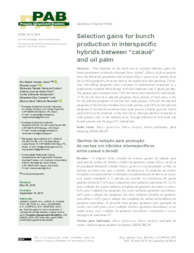Selection gains for bunch production in interspecific hybrids between "caiaué" and oil palm.
Selection gains for bunch production in interspecific hybrids between "caiaué" and oil palm.
Autoria: GOMES JUNIOR, R. A.; LOPES, R.; CUNHA, R. N. V. da; PINA, A. J. de A.; QUARESMA, C. E.; CAMPELO, R. D.; RESENDE, M. D. V. de
Resumo: The objective of this work was to estimate selection gains for bunch production in hybrids obtained from ?caiaué? (Elaeis oleifera) parents from the Manicoré population and oil palm (Elaeis guineensis) parents from the La Mé population, from the third to the eighth year after planting. Thirtynine full-sibling progenies were evaluated in experiments conducted in a randomized complete block design, with four replicates and 12 plants per plot. The genetic gain estimates were 27.6% for the ten best selected F1 individuals, 13.7% for the four best selected progenies from parents of both sexes, 6.4% for the selected progenies of the five best male parents, 6.0% for the selected progenies of the two best families from male parents, and 4.0% for the selected progenies of the best descendants from male parents. Genetic gains for bunch production can be achieved, in the short term, through selection restricted to male parents, and, in the medium term, through selection of both male and female parents and cloning of F1 individuals.
Ano de publicação: 2019
Tipo de publicação: Artigo de periódico
Unidade: Embrapa Amazônia Oriental
Observações
1 - Por padrão são exibidas publicações dos últimos 20 anos. Para encontrar publicações mais antigas, configure o filtro ano de publicação, colocando o ano a partir do qual você deseja encontrar publicações. O filtro está na coluna da esquerda na busca acima.
2 - Para ler algumas publicações da Embrapa (apenas as que estão em formato ePub), é necessário ter, no celular ou computador, um desses softwares gratuitos. Sistemas Android: Google Play Livros; IOS: iBooks; Windows e Linux: software Calibre.
Acesse outras publicações
Acesse a Base de Dados da Pesquisa Agropecuária (BDPA) para consultar o acervo completo das bibliotecas da Embrapa.

